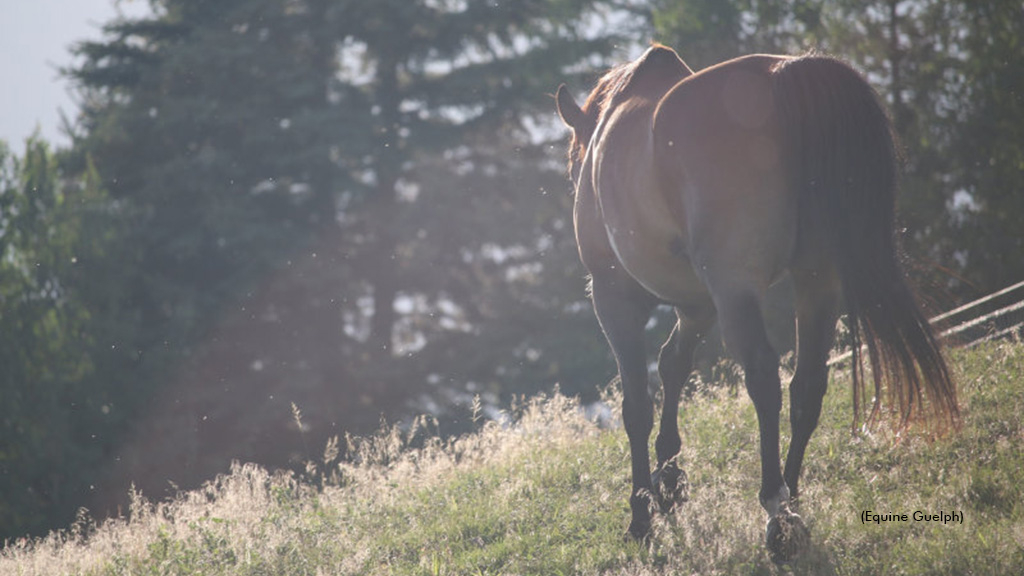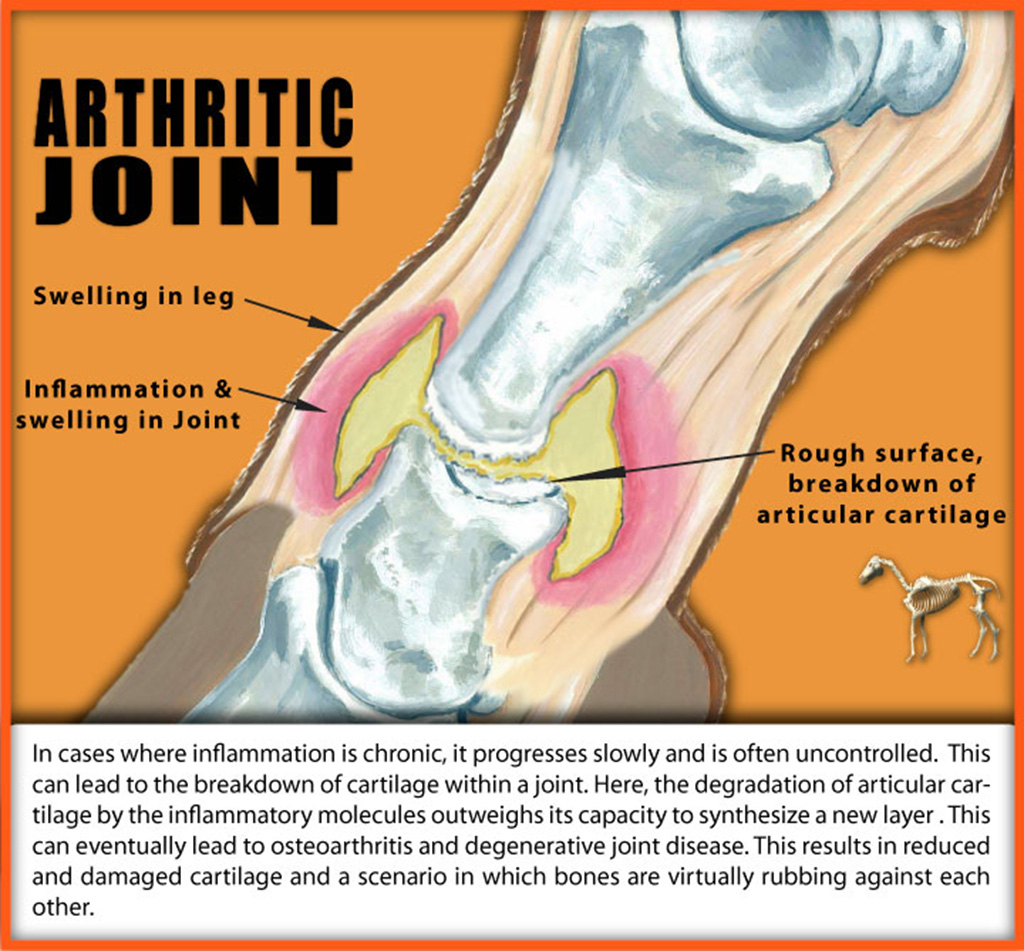
Chronic pain and lameness resulting from osteoarthritis (OA) and other musculoskeletal conditions are the most common causes of poor quality of life in senior horses. In the month of September, Equine Guelph is promoting Senior Horse Education, increasing awareness of ways caregivers can be the best advocates for the health and welfare of their senior equines.
Equine Guelph offers a free interactive healthcare tool called the Senior Horse Challenge in addition to a Senior Horse online short course with expert instructor Dr. Bettina Bobsien from Sept. 16 – 27.
Priorities for senior horse care include early intervention for health challenges (including OA) and making management changes as needed. This means honing your skills for recognizing pain in an animal that is adept at hiding it.

Senior horses have put in the miles to sustain wear and tear on their joints which can lead to inflammation and then osteoarthritis. Of course, this can also happen in equines under a decade old, especially where poor conformation and strenuous activities have come into play, but, just as with humans, the probability of arthritis increases with age.
As a horse owner, picking up on the early warning signs allows for early intervention, which can slow the progress of OA. Paying close attention to your horse’s legs, recognizing subtle signs of pain and detecting gait abnormalities are all important. Not all horses exhibit lameness at the onset of arthritis. Early diagnosis is the key in managing the progression of arthritis and joint disease. Is your horse stiff warming-up? Do they sometimes plant their feet, refusing to move forward, refuse jumps or grind their teeth when being asked to perform? Owners should not delay in calling the vet when any of these signs are present or if heat, swelling, pain or loss of function are detected.
Acute swelling (sudden onset) occurs as a result of blood vessel dilation and the movement of fluid into the joint to help repair damaged tissues. This type of swelling is often soft to touch and your horse may be sore upon palpation.
Chronic swelling, or long-term swelling, of an inflamed joint may feel harder due to the production of new bone as a result of the chronic inflammatory process.
When you feel heat, a joint may have become inflamed and the temperature of surrounding structures may rise.
Palpating, or feeling your horse’s joint, is an easy method to identify potential inflammation. When you are feeling your horse’s leg, check for any signs of heat, swelling, pain and reduced range of motion. Use the opposite leg of your horse for comparison.
If OA is diagnosed, there are numerous treatment options available, and your veterinarian will discuss the best options for your horse for pain control and to treat the cycle of inflammation that can lead to chronic arthritis.

"The importance of seeking input from your veterinarian and farrier to help maintain the health of an elderly equine and to spot conditions that will need special treatment sooner rather than later cannot be understated,” said Gayle Ecker, Equine Guelph director. “Recognizing changes and not just dismissing them as ‘old age setting in’ is a large part of the responsibility assumed when caring for the senior horse to ensure a good quality of life.”

One section of the Senior Horse Challenge is geared toward becoming proficient at pain recognition. As a prey species, the horse is a master at concealing weakness. The savvy owner is vigilant noticing subtle changes in behaviour and monitoring for lumps, bumps, cuts, heat or swelling and sensitivity to touch, every time they groom.
Research in detecting pain in horses has come a long way with publications of facial grimace scales and comprehensive lists of behaviours associated with discomfort. Changes in behaviour are very often the first signs of pain.
The Senior Horse Challenge is available on Equine Guelph’s education platform at thehorseportal.ca. This invaluable tool takes five minutes to complete and provides downloadable print outs of helpful tips and fact sheets.
Topics include:
Old injuries and wear and tear necessitating the scaling back of athletic ventures while balancing benefits of maintaining an active lifestyle for healthier joints. Mild exercise can help reduce inflammation in tendons, ligaments and joints. It is imperative to work with your veterinarian to decide what level of activity is suitable for your horse.
Seniors who are no longer under saddle still need daily care to stay in optimal health. One way to keep them moving can be to extend turn out time. Preventing obesity is important for those weight-bearing joints. Knee, hock, fetlock, pastern and coffin joints are prone to arthritis since they endure concussive forces. These forces can be significantly reduced by maintaining an optimal body condition score.
Keeping on top of farrier appointments to maintaining correct hoof balance is also important as a poorly balanced hoof can further overload joints.
One may fantasize their equine will age gracefully until the end, but reality requires you to be prepared for changes in health status that require addressing without delay. Horse owners need to be on the look-out for musculoskeletal abnormalities, gastrointestinal issues, dental problems, eyesight issues, heart trouble, respiratory concerns, PPID/Cushings, metabolic disorders and osteoarthritis – which all become more prevalent with age.
Equine Guelph thanks Boehringer Ingelheim Animal Health Canada for sponsoring both of its senior horse online resources -- the free tool and Senior Horse online course.
“As horses are living longer, maintaining their health and well-being is imperative for their quality of life,” said Randy Trumpler, Equine Business Unit Director at Boehringer Ingelheim. “This online tool and the Senior Horse course offered by Equine Guelph are great resources that provide practical ways to prepare for your horse’s golden years.”
Equine Guelph will welcome back Dr. Bettina Bobsien as our Senior Horse course instructor. This Vancouver Island-based veterinarian brings a wealth of experience with a lifelong passion for both animal care and animal welfare, working with both the BCSPCA and Humane Canada on a variety of animal welfare issues. She has served as the chair of the CVMA Animal Welfare Committee, chair of The Equestrian Canada Health and Welfare Committee, and the veterinary ethics editor for the Canadian Veterinary Journal. Registration for the two-week online course runs through the Sept. 16 start date at thehorseportal.ca.
(With files from Equine Guelph)

